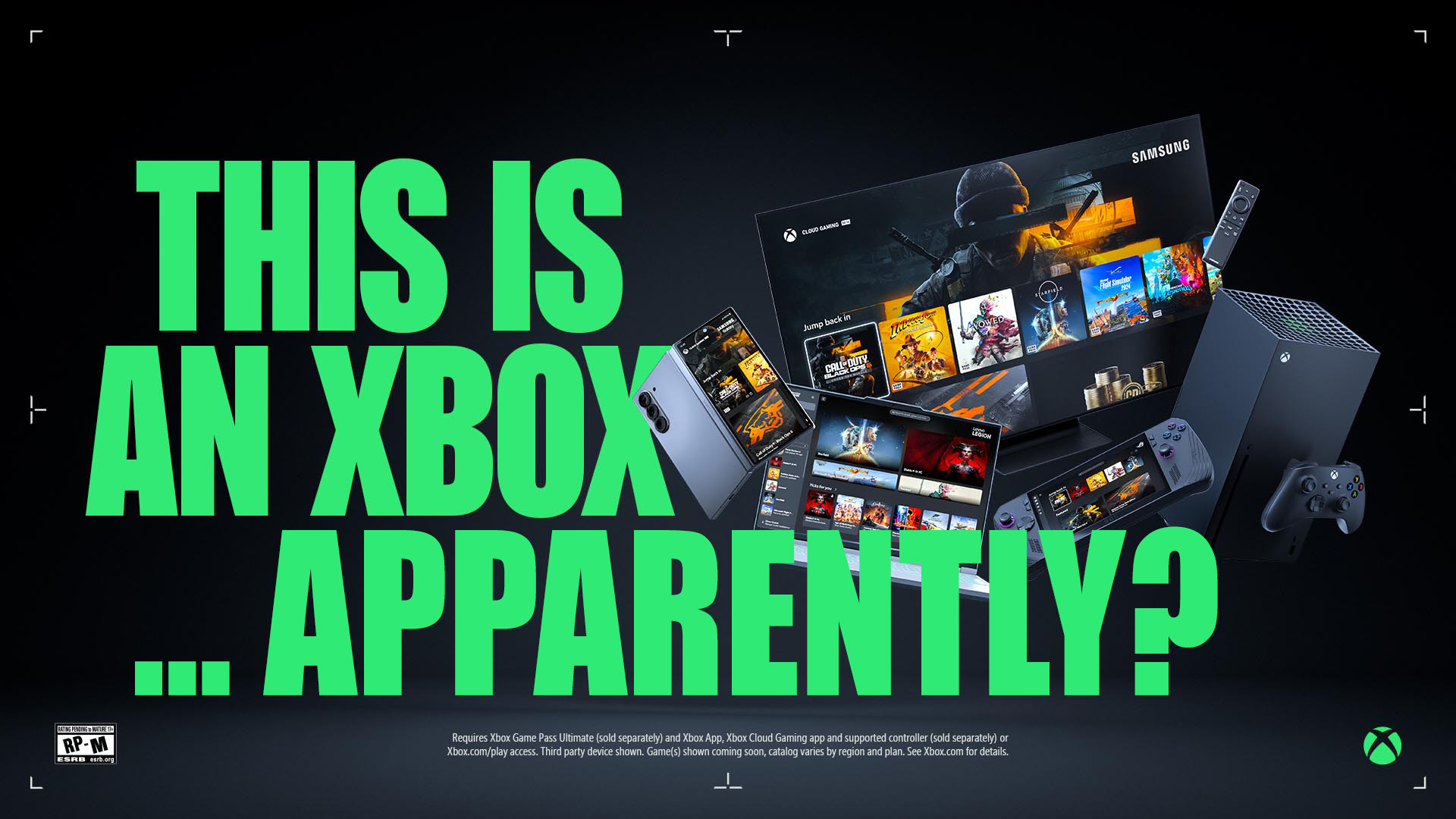
Last week during my brief sojourn away from work, Microsoft debuted its new ad campaign for Xbox. It's fairly usual to see products kick start new ad campaigns and debut new marketing slogans ahead of Christmas and Black Friday, which tends to be particularly busy for all types of products and services. Microsoft's Xbox typically enjoys strong sales over the holiday period, which is why they've also cut the price of the Xbox Series X by $50 at Amazon and other retailers. Other accessories like the WD_Black Storage Card for Xbox Series X|S are also on sale, as people scramble to buy gifts for loved ones (and themselves, ahem).
Indeed, as of writing, the disc-based Xbox Series X is sold out at Amazon US, which suggests Microsoft is still selling consoles almost as fast as it can manufacture them. I even wrote an editorial last week about how Microsoft has some amazing Xbox momentum as it closes out 2024.
Given that stock still seems hard to come by at times, perhaps Microsoft's new ad campaign makes at least some sense on the surface, given that they are telling people that you don't need an Xbox to actually play Xbox games. In reality, though, I think Microsoft's new "This is an Xbox" marketing blitz is going to do more harm to the brand than good, at least today. It smacks of old mistakes of marketing against a future vision, rather than a present day product reality, and undermines the fact that today, as of right now, Xbox consoles are still the only true "Xbox."
🎃The best early Black Friday deals🦃
- 💽Seagate Xbox Series X|S Card (2TB) | $199.99 at Best Buy (Save $160!)
- 📱iPad 9th Generation (64GB) | $199.99 at Best Buy (Save $130!)
- 🎮Xbox Series X (1TB) | $449.99 at Best Buy (Save $50!)
- 🖥️ABS Cyclone Desktop (RTX 4060) | $1,099.99 at Newegg (Save $400!)
- 📺HP Curved Ultrawide (34-inches) | $349.99 at Best Buy (Save $130!)
- 💽WD_Black Xbox Series X|S Card (1TB) | $99.99 at Best Buy (Save $50!)
- ⌨️Razer BlackWidow V3 Mini HyperSpeed | $101.99 at Best Buy (Save $98!)
- 🖱️Razer Basilisk V3 Wired | $39.99 at Best Buy (Save $30!)
- 💽WD_BLACK Handheld SSD (2TB) | $179.99 at Best Buy (Save $60!)
- 🎧Astro A50 Wireless (Xbox & PC) | $149.99 at Best Buy (Save $100!)
Why is Xbox once again marketing the future rather than the present?
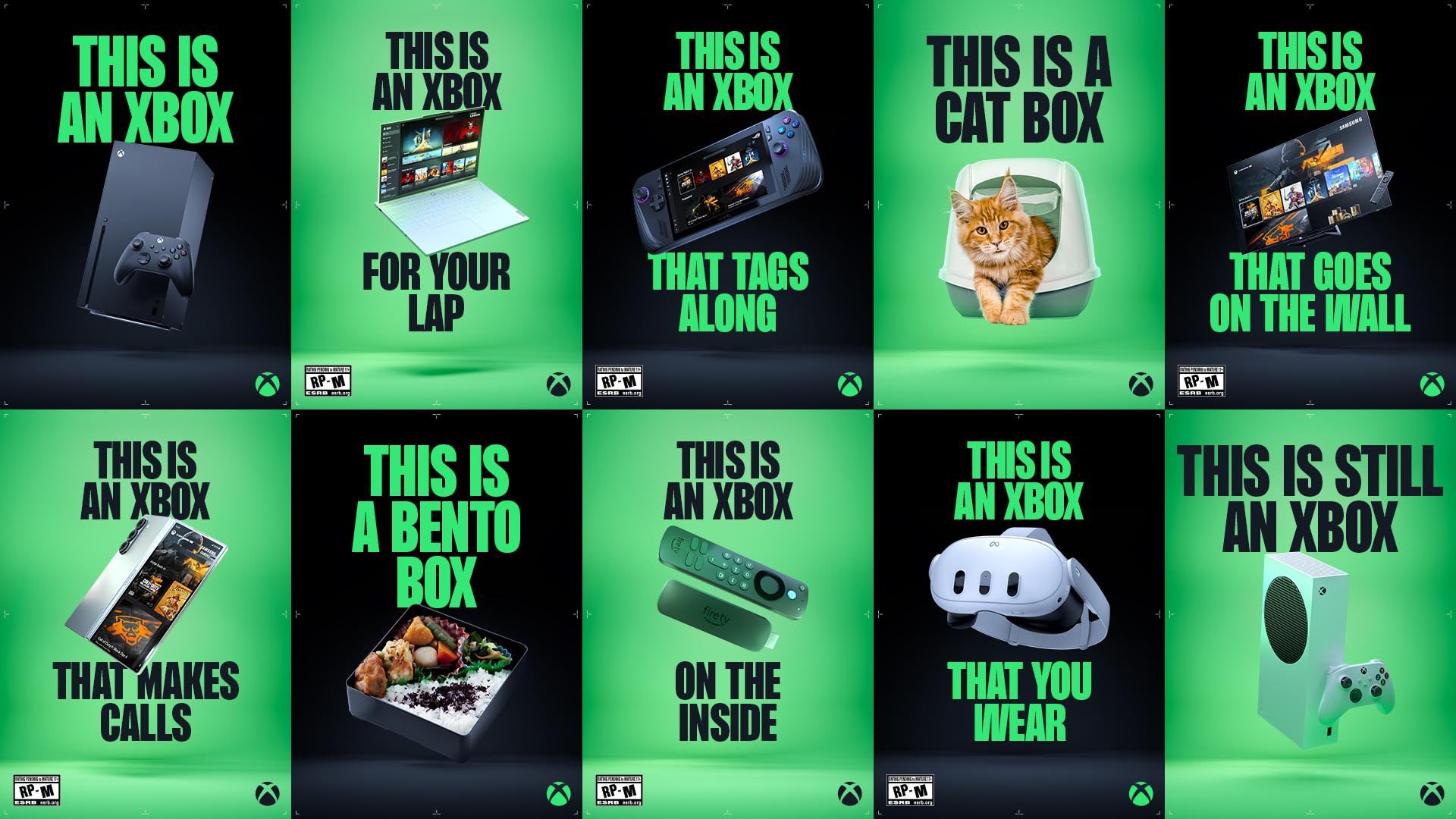
I've seen the discourse online about this ad campaign, but even before hearing from others, I immediately found myself perplexed. I am among the few people out there who actively uses the Xbox ecosystem as Microsoft is envisioning it here, and I do love the vision. I love the fact I can take my Hollow Knight or Death Stranding save from my Xbox Series X to my Lenovo Legion Go via my cloud saves (for free, unlike some other platforms). I love that there are dozens of games that support cross-buy and cross-progression via Xbox Play Anywhere. I love that there are some games I can even play with touch controls via Xbox Cloud Gaming, like Vampire Survivors, which play well via a small screen.
The issue is that it's so, so piecemeal. It's SO early days, and very much what I would describe as an "Early Adopter" experience. Microsoft itself even knows this, which is why Xbox.com/play cloud gaming is emblazoned with the "beta" tag still after several years. How many people are actually going to go through the trouble of pinning a website to their home screen, for a service that isn't available to download directly from iOS or Google Play anyway? I've also written only recently about how the Xbox app experience on Windows PC is still sub-par. Why Microsoft thinks it's ready for a big-budget global marketing campaign blitz strikes me as odd as someone who is actively using it.
just spotted the new Xbox marketing campaign “This is an Xbox” pic.twitter.com/7kW2kM0t1LNovember 17, 2024
"This is an Xbox for your lap," the above London billboard reads. The big claim earned an immediate grimace from me in multiple directions. What is the general public, to whom this is targeted, supposed to take away from this claim? Has Xbox itself forgotten what an Xbox actually is? Because for my money, a laptop is absolutely not an Xbox save for a few tendrils of vaguely useful added value for current Xbox console users. The Xbox app on PC has dozens of games to buy, rather than tens of thousands of games you can find on Steam. The Xbox app on PC is missing basic features like cloud save sync notifications, while also having a usability gap in terms of speed and responsiveness versus competing staples. Even still, it's not like any of those features are actually showcased in this ad here.
DEAL: WD_Black Xbox Series X|S Storage (-37% OFF) @ Amazon US
I'm not quite sure what Microsoft expects people to think when they see this. There isn't even a controller or even a mouse present, nor is there a video game present on the screen. It showcases the Xbox app, which 99% of the people viewing this ad will have never seen before or be able to identify. What game can you realistically play from your lap on the Xbox app anyway? Am I expected to run Halo Infinite ranked with the trackpad here? All this is without mentioning the fact that it barely runs any Xbox games. The pool of games that support Xbox Play Anywhere — which gives you cross-progression within the Xbox ecosystem — is vanishingly small.
In what timeline, realistically, is a Samsung Galaxy Fold an Xbox? Certainly not the one I'm living in.
This is just one example in a variety of caveats that come with advertising things like the Xbox cloud-baked Amazon Fire Stick, occasionally-Xbox ASUS ROG Ally, and other devices as "true" Xbox consoles. Some of them have Xbox features, but much like the mistakes of the Xbox One launch, Microsoft is leading with a vision of Xbox that is subpar over what is already there.
Putting a Samsung Galaxy Fold on the same billboard as an Xbox Series X is insanity to me, when one costs thousands of dollars, and doesn't even have Xbox cloud gaming controllers that actually fit the product. You need a full-blown Xbox controller, and a Samsung Galaxy Fold kickstand cover to realistically play anything Xbox on a Galaxy Fold. Microsoft has also vastly decreased the amount of games it's putting on Xbox Cloud Gaming with bespoke touch controls too — the team handling this feature was laid off during Microsoft's cuts this year. If Microsoft is talking about native mobile games, barely any of them actually come with Xbox integration for things like achievements or online status.
In what timeline, realistically, is a Samsung Galaxy Fold an Xbox? Certainly not the one I'm living in.
This is, again, just one example of the problems with the broad-strokes claim "This is an Xbox" attached to any device running Android — at least today.
Why is Microsoft confusing people into not buying an Xbox in the run up to Christmas?
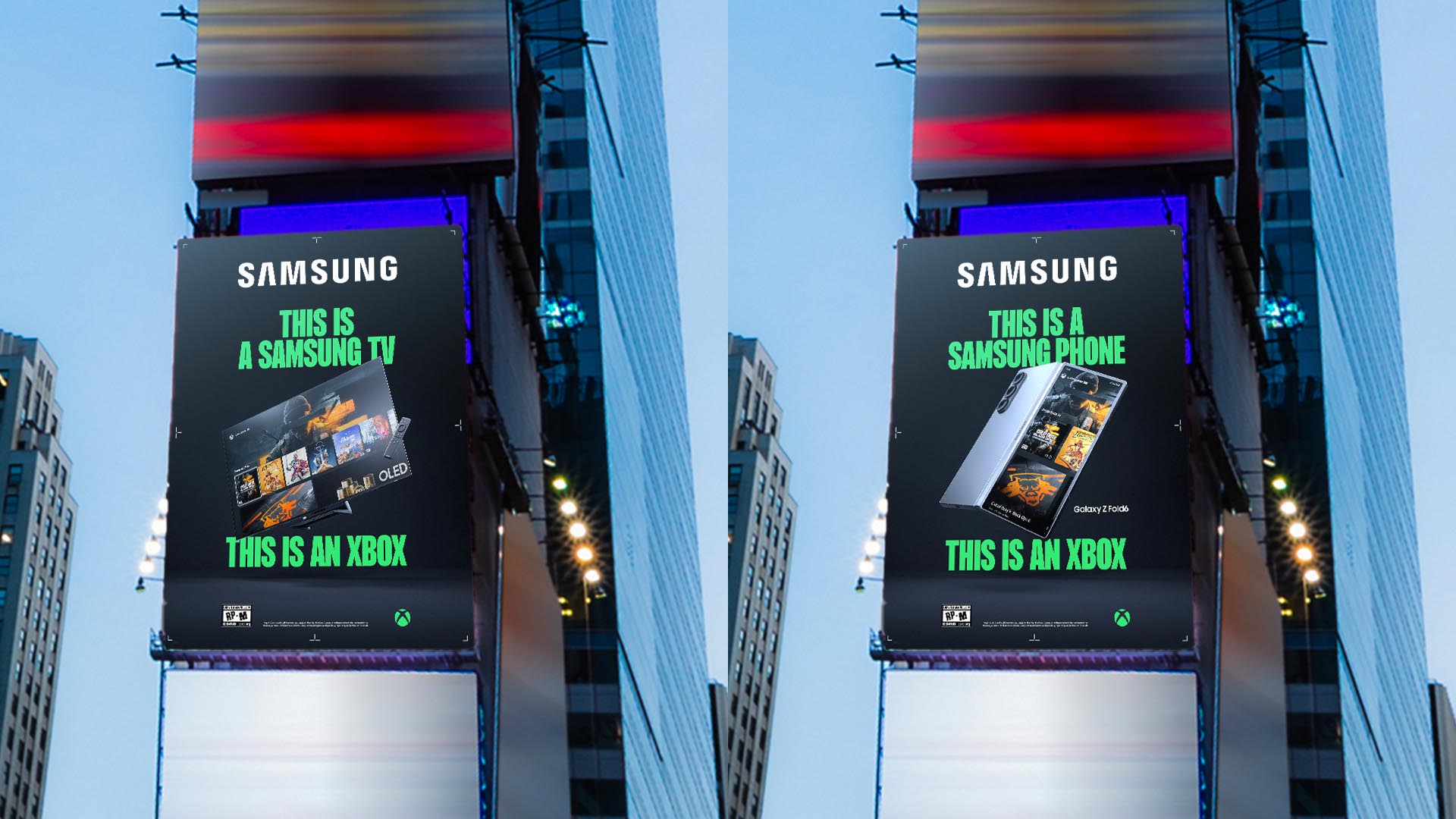
I noted earlier that the Xbox Series X was sold out as of writing this post, although new stocks are probably due to land any day now. It precipitates a wider problem not just with Xbox, but the entire gaming industry — the console user install base is static, and may even be in decline.
Analysts like Newzoo and PlayStation's own financials detail how console sales seem to have a historical hard ceiling, with the total install base globally hovering around 300 million. Strong competition from free-to-play forever games that live on every platform are eating into the "variety gamer" audience that powers the PlayStation / Xbox paradigm, leading platform holders to figure out where the next wave of growth will emanate from. Microsoft for its money has the correct strategy broadly speaking, in my view — which is finding people where they are rather than trying to persuade people to convert to Xbox console gamers. You can argue the execution has been less-than-stellar though.
Microsoft's mobile Xbox game store announced for Android and iOS is delayed, and in my view, will probably never actually launch. Xbox Cloud Gaming's "buy to own" library will hopefully launch this month, although it was announced literally years ago — and is expected to include only a subset of Xbox games from the library, rather than all of it.
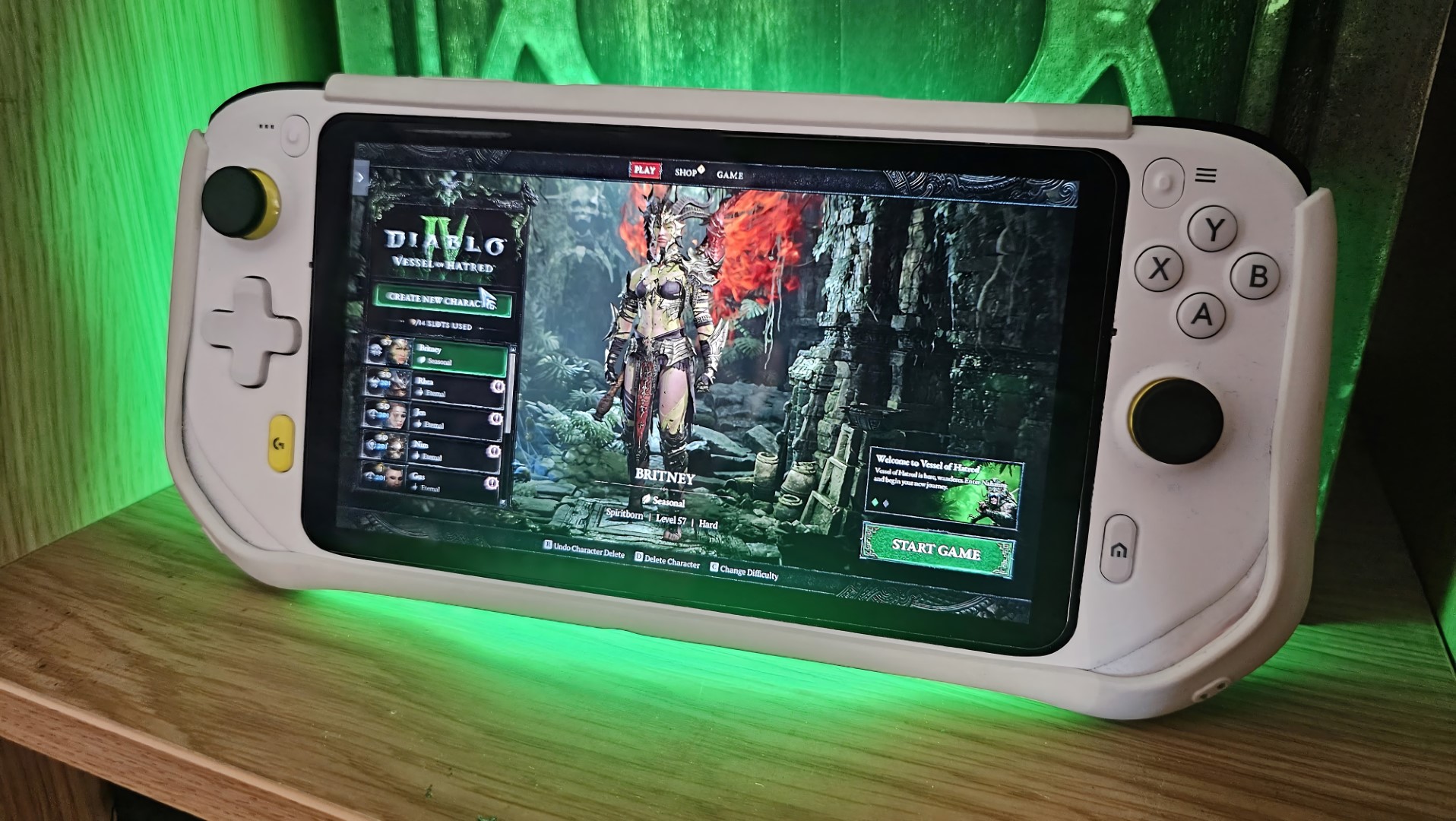
I just can't help but wonder what purpose it serves for Microsoft to tell people devices that can do a handful of partial Xboxxy-like things. If my first experience of the Xbox ecosystem was the Xbox app on PC, with all of its foibles, I probably wouldn't be too encouraged to remain in that ecosystem. If I tried Xbox cloud gaming on my phone and discovered only a tiny portion of the games support touch, I'd probably not stick around. I keep trying to ask myself how I would explain to someone who had just asked me "What makes my phone an Xbox?" I'm not sure I'd have a particularly compelling answer for them.
That's why ultimately I'm wondering if this campaign was supposed to line up with previously announced features that slipped. The Xbox game store for Android and iOS was supposed to launch this quarter, but now isn't. Xbox buy-to-own cloud games is supposed to launch this month too, and seems to be on track last we heard. Xbox has had some wins with Xbox Play Anywhere on PC too lately, with Death Stranding, Metaphor Re:Fantazio, and Final Fantasy Pixel Remasters all hitting the cross-buy, cross-progression Xbox service without an Xbox Game Pass tie-in.
Like I said earlier, the vision is awesome. The vision is excellent. The vision is why I invest in the Xbox ecosystem, despite its shortcomings and mixed messages over the past few years. But why market to a vision that isn't fully realized? Why denigrate the premiere Xbox experience as it exists today? The only place where you can get a true, full-fat Xbox experience is Xbox Series X|S.
Actually, today, only Xbox is an Xbox
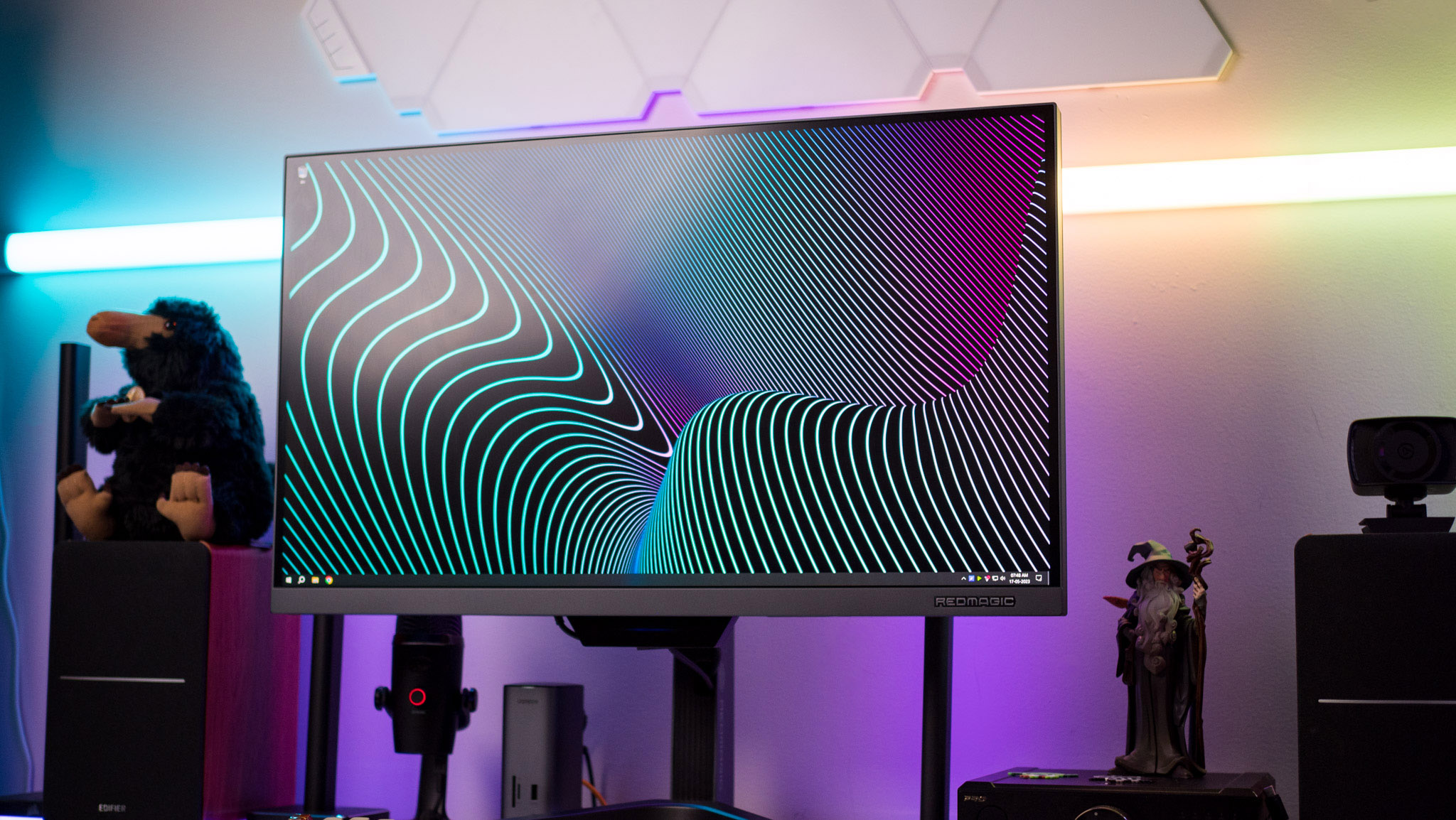
• Best Xbox / PC headsets in 2024
• Best upcoming Xbox / PC games
• Best Xbox controllers
• Best Xbox accessories
• Best small gaming PCs
• Best gaming laptops in 2024
Microsoft's "This is an Xbox" ad campaign is actually solid on paper. It showcases where Xbox is going. It showcases what the future of gaming in general will look like. Microsoft is good at predicting the future. They did it with the Xbox One back in 2013, which was a digital-first experience that people ultimately rejected. Ten years later, people are increasingly preferring all-digital.
The problem is, like in 2013, you can't tell people what they should like or should want. Above all, you can't market things based on a promise or a vision of the future, as 2013's Xbox One launch spectacularly demonstrated. I love the direction Microsoft is heading towards. I love the idea of getting ALL of my Xbox games on my phone, anywhere, any time, via 6G or 7G wireless on any device I own. We're years away from that future, if indeed it materializes at all. I have faith that it will, but we're nowhere near there right now. So why tell every day people that Xbox has already reached that destination?
Microsoft's "This is an Xbox" ad campaign is great on paper. It's just absolutely the wrong time to be making the claim.
The pieces are in place, the systems work, but the vast majority of Xbox games aren't available on cloud. The vast majority of developers opt out of Xbox Play Anywhere between PC and Xbox. The vast majority PC developers don't support the Microsoft Store ecosystem without a Game Pass tie-in. This campaign celebrates the underlying system rather than the real reason people play games in the first place — content, which is arguably still Microsoft's weakest pillar in its ecosystem.
Microsoft's "This is an Xbox" ad campaign is great on paper, and I fully concede that I'm no marketing guru. I'm fully prepared to eat crow if this campaign does blow up and helps Xbox reach new users as is most likely the goal. I just can't help but feel that today, as of November 2024, it's absolutely the wrong time to be making the claim that random phones, laptops, and TVs represent a true Xbox experience. It's a poor time to introduce the general public to Xbox via their phone, Fire Stick, or Samsung Smart Fridge. It's also a very poor time to undermine the traditional Xbox Series X and Xbox Series S console, given the nerves people have over whether Microsoft is even still committed to Xbox hardware in the long term.







